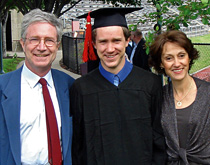
The students are scattered throughout the conference room that is stocked with university stationery, soda, and plenty of pizza. Notably absent are laptop computers. Instead, the students, seated at banquet tables, are telling personal stories with ballpoint pens. Their message, though, is the same—thanking Carnegie Mellon donors for helping them pay for college. One of the 300 or so students passing through the University Center gathering is Sasha Urquidi, a junior business major. She doesn't need to mull over what to say because she felt moved to write her letter before the pizza party sponsored by Donor Services.
Urquidi's journey to that room started in the Dominican Republic, where she was born. Her family moved to Rhode Island when she was eight, but she returned to the island during her junior year of high school. The lessons she learned that year went beyond the classroom. She saw economic struggles in the Latin American country, even for those who had college degrees.
It's a recollection she took with her to Carnegie Mellon. During her sophomore year, she helped organize a 10-day student trip to León, Nicaragua, through Students in Free Enterprise, where members would help local businesses and the community.
The team opted not to stay at a hotel, preferring the hospitality of local families. Although Urquidi speaks fluent Spanish, none of the other students did, and many of them improvised conversations with parents and their children, mostly with charade-like gestures. Every morning there, the volunteers conducted basic business workshops for aspiring entrepreneurs, big and small. In the afternoons, everyone worked side-by-side to build a small home, brick-by-brick, in a village at the base of a volcano just outside León. As each day ended, the tired and grimy students headed to their hosts’ homes, where they shared rice and beans, tortillas, goat cheese, and plantains at the dinner table.
Since the trip, local residents have updated Urquidi through email; for many of them, business is good. Their appreciation especially touched her, she says, because she has witnessed firsthand many ineffective approaches for offering help to developing countries. "I saw the difference between organizations that came with this special sense that, 'I'm better, I'm going to go help the poor,' rather than people that genuinely just want to get to know the town and genuinely just wanted to be there."
The trip reinforced her belief that leadership is often a matter of humbly supporting others—not shouting orders—which makes possible an empowering transfer of skills and resources. And she says she also understands better now that assisting others is a somewhat circular process—the time she and her classmates invested in the families of León will enable them to give to others, just as Carnegie Mellon donors help give her a chance to get an education.
Her experience certainly gave her plenty to write about to her donor in the thank-you note she dropped off at the pizza party. "It was very personal," she says, "letting them know where I come from.
—Mark Kramer



